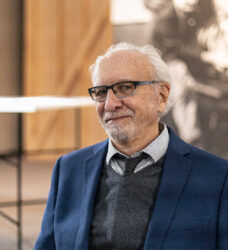The Making of Picasso, 1901-1925
Overview
Pablo Picasso is the most famous artist of the first half of the 20th century. He is the artist most identified with the dizzying changes characteristic of that era — of what we used to simply call “modern art” (now known as Modernism). Most of the works for which Picasso is best known—including The Old Guitarist (1903-4), Les Desmoiselles d’Avignon (1907), Ma Jolie (1911-12), and Woman in White (1923)—were produced in a twenty-five-year span between 1901 and 1925. As these disparate examples suggest, this was a period of headlong changes for Picasso himself. During these two and a half decades he went through a series of very different periods, beginning with the Blue, followed by the Rose, the Primitive, the Analytic Cubist, the Synthetic Cubist, and finally his Neoclassical Period. In this lecture, Professor Collins will trace those broad changes with an eye to identifying the various influences, concerns, and purposes both biographical and art historical.
Recommended Reading:
The Success and Failure of Picasso, by John Berger
A Life of Picasso, vols. 1-4, by John Richardson
Pablo Picasso: A Retrospective – William Rubin, ed.
Discussion Questions:
- Why are Picasso’s paintings from the Blue Period so popular?
- Some art historians object to the biographical approach that I’ve taken to most of the art discussed in this lecture, arguing that the works should stand on their own, succeeding or failing as artworks entirely on their own intrinsic merits. How do you feel about this question?
- Is it possible to understand and/or enjoy Picasso’s Analytic Cubist paintings without an art historical explanation?
- I know this is beyond the scope of my lecture, but is Picasso’s Guernica (1937) a great painting?



I can hardly be considered an art critic, but I found this lecture particularly difficult. Professor Collins had all the information and knowledge to convey, however, he was very hard to listen to whilst he was conveying that information. The lecture would have been much shorter, and allowed for more question at the end if he did not stutter and seem to forget his train of thought. Sorry, but it was all I could do to continue listening.